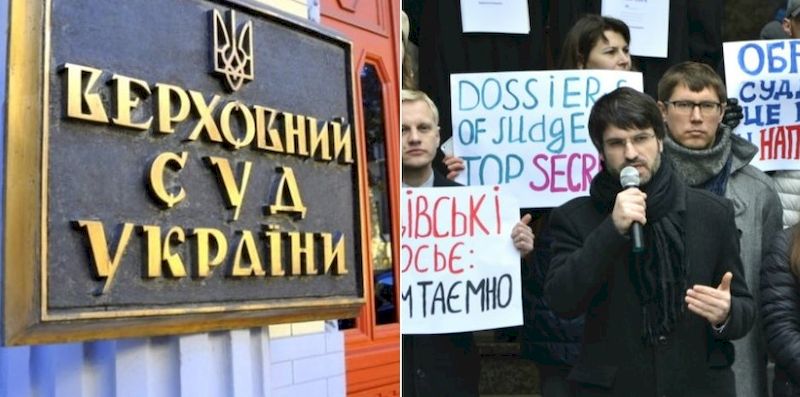25% of the new Supreme Court judges received negative assessments

The results of Ukraine’s first competition for Supreme Court judges are in. The good news is that the candidate who gained notoriety for his public defence of Viktor Yanukovych’s ‘dictatorship laws’ and for a ruling evicting a 97-year-old will not be one of the 120 new judges. The bad news is that this is only because Yaroslav Romanyuk announced his withdrawal on Thursday evening when it was already clear that he had been assigned one of the posts.
There is other good news, such as the appointment of Arkadiy Bushchenko, a well-known human rights lawyer who is currently the Executive Director of the Ukrainian Helsinki Human Rights Union. Many other appointments, however, were strongly resisted by the Public Integrity Council, but to no avail. The Council, which is made up of representatives of civil society, had provided detailed grounds for their negative opinions regarding 140 candidates (37%). These were based on intensive study of previous court rulings, including those involving Euromaidan, information from the National Anti-Corruption Bureau, as well as on over three thousand reports received from members of the public. Information was also provided that needed to be checked concerning a further 128 candidates.
The rules for the competition had seemed exemplary. The Council’s opinion had to be taken into account, with a two thirds majority of members of the High Qualification Commission of Judges [HQCJ] needed to override a negative assessment regarding each specific candidate. This was, however, on the basis of a secret vote, and proved relatively easy to achieve.
According to Mykhailo Zhernakov from the Rehabilitation Package of Reforms [RPR], after all stages had been passed, there were 319 candidates in the running, with 76 of them being people whom the Public Integrity Council had negatively assessed. This is 23.82% of the full number, with the percentage after the results have been announced, even higher at 25%.
The successful candidates include Viacheslav Nastavnyy who is known to have passed a ruling in the overtly political criminal proceedings and imprisonment during the Yanukovych period of Yury Lutsenko, who is now the Prosecutor General. He has the second highest rating for the Cassation Court in Criminal Cases, just above another candidate whom the Council had negatively assessed.
Stanislav Holubytsky had been deemed unsuitable because of his part in sentencing Volodymyr Panasenko to life imprisonment despite the absence of any credible evidence.
It should be stressed that many lawyers and human rights defenders are convinced that nobody ever believed that Panasenko had anything to do with the bomb on 26 October 2006 which insured a Lviv politician and killed a young girl who was walking past the car that exploded. They believe that he was arrested and subsequently sentenced to life imprisonment because somebody had to be found.
There are even MPs whose concern about miscarriages of justice, such as that with respect to Panasenko has prompted them to produce Draft law No. 2033a giving the men in such cases the chance of a judicial review. This is being stalled by other parliamentarians, with the suspicion strong that there is resistance in the Prosecutor General’s Office (and perhaps other departments) to any review since it will expose corrupt prosecutors, police, judges, etc.
There are also some successful candidates whose unexplained wealth or connections have prompted scrutiny by the Skhemy anti-corruption journalist investigative team. As reported earlier, the journalists’ presence outside the building where the first group was taking the written test, and their uncomfortable questions about the expensive vehicles that currently working judges were turning up in led to a dramatic increase in the number of candidates arriving by public transport on subsequent days!
Some successful candidates have been the subject of other journalists’ scrutiny, though this did not always form the main reason for a negative assessment. The Public Integrity Council stressed, for example, that its advice not to appoint Alla Lesko was primarily linked with the active help she provided in ensuring that judges directly implicated in persecuting Euromaidan activists retained their posts.
In its press release, HQCJ Chair Serhiy Kozyakov is very upbeat about the competition and about how the successful candidates will become “the new faces of the Ukrainian justice system”. Of some this will hopefully prove to be the case. Others seem, however, to represent an old face, discredited under the Yanukovych regime, and during Maidan, yet seemingly untouchable.
More details about earlier scandals with the first open competition for 120 vacancies here: Your Dishonour as title for many judges in failed Ukraine Supreme Court reform?





